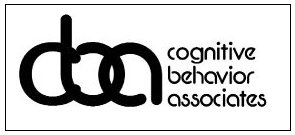Frequently Asked Questions
Q. What is Cognitive Therapy?
A. Cognitive Behavior Therapy (CBT) is the method used for individual psychotherapy at CBA. CBT treatment is based on a combination of both behavior therapy as well as cognitive mindfulness techniques that are individualized to the specific patient problem. CBT is generally a time-limited psychotherapy, in which an individual has appointments over the course of 3-6 months, with follow-up sessions as needed. In each case we make use of treatments have been shown in controlled trials to have efficacy with the problem or combinations of problems.
Q.What are some common anxiety and mood disorders?
A. Please visit the following link for more details:
http://www.nimh.nih.gov/health/topics/anxiety-disorders/index.shtml
http://www.nimh.nih.gov/health/topics/depression/index.shtml
http://www.nimh.nih.gov/health/topics/bipolar-disorder/index.shtml
Q.What are therapy sessions like?
A. Initial evaluation sessions are scheduled for 2 hours. Regular in-office sessions are 45-50 minutes. Depending on patient needs, there can be times when one will meet with their therapist for variable amounts of time. Cognitive-behavioral therapy tries to work efficiently in the time allotted for each session. Unlike other forms of therapy which are unstructured, you and your therapist will set an agenda for each meeting. The agenda might include a review of your experience in the previous session, your homework, one or two current problems, a review of what you've accomplished in this session, and homework for the next session.
Q. How long is treatment?
A. The average patient will typically be seen for 3-6 months on a weekly basis, and then tapering off depending on their progress and needs.
Q. Is there homework between sessions?
A. Yes, a hallmark of cognitive-behavioral therapy is the commitment to work collaboratively with the therapist. Similar to the role of a personal trainer at a health club, you would expect to get guidance on how to exercise when the trainer is not there. The same thing is true in CBT. What you learn in therapy is what you practice outside of therapy. Research demonstrates that patients who carry out homework assignments get better faster and stay better longer. Your self-help homework might include reading, keeping track of your moods, thoughts and behaviors, scheduling activities, developing goals, challenging your negative thoughts, collecting information, changing the way you communicate with others, as well as other assignments.
Q. Do you prescribe medication?
A. Consulting psychiatrists are available upon request.
Q. How are patients evaluated?
A. When you begin cognitive-behavioral therapy, you will begin with an initial evaluation. Your therapist will ask you detailed questions on a variety of topics (e.g., the situations and relationships that may be troublesome for you), and to fill-out a variety of self-report forms that assess a range of symptoms and problems (e.g., depression, anxiety, anger, fears, physical complaints, personality, and relationships). Specifically, we will want to learn the kinds of thoughts and assumptions you may have, what behaviors you engage in that are rewarding or unpleasant to your and others, and your style of communicating and listening. The purpose of this evaluation is to gather sufficient information on you so that you and your therapist can know quickly the kinds of problems you do (or do not) have and the degree of your problem.
Q. How are treatment plans developed?
A. You and your therapist will work together to develop a plan of therapy. This might include how often you need to come, the relevance of medication, your diagnosis, your goals, skill acquisition, needed changes in the way you think, behave, and communicate, and other factors. As part of your treatment plan, your therapist will develop a conceptualization of the nature of your problem. This will include a review of your past experience with similar or different problems, the habitual and problematic style of thinking and behaving that characterizes your problem, and a strategy to develop new ways of thinking, behaving and interacting to help you solve your current problems and prevent them from re-occurring
Q. What about group therapy?
A. In addition to individual and couples therapy, we also offer group therapy and specialized workshops or programs. Your therapist can inform you of the scheduling of these groups and workshops. To see what groups are currently running, please click here.

